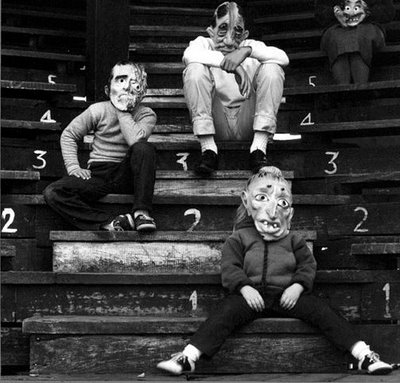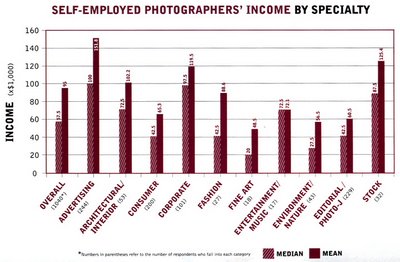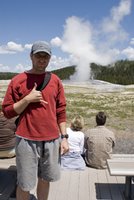I heard on NPR's Marketplace tonight that the digital camera would be one of the holiday's #1 gift purchases. Wow, what an exciting time to be involved in photography! And if you haven't made the plunge already, perhaps this might be an occasion to begin to consider such a purchase for yourself (or better yet, for someone to purchase it for you).
And if you're shopping around, I've got a couple tips and advice:
1) DSLR (digital single lens reflex) The prices may seem a bit stiff to begin with, but realize you'll never be buying film and never paying for processing again (nor will you be spending an hour developing B&W film). To start, you're looking at around a $600 committment and on upwards to $1000 - $2000 if you get real serious.
2) Canon or Nikon. These 2 companies are where you should be looking. They have quality cameras and quality glass, i.e. lenses. They both have an entry camera that's around $600 - Canon Digital Rebel XT and Nikon D40. There are other companies, but I am seriously biased towards one of these two great stalwarts of the industry.
3) At least 6 megapixels. 6 megapixels will give you the image quality of 35mm film. More than 6 start to move you into the image quality of medium format. (Hint: this might be a good time to look for a used medium format film camera too. The prices are dropping into the bargain basement.) Jeff Rogers has a very nice 40 x 60 inch photograph that he shot with a 6 megapixel camera. A lot of it comes down to editing and Photoshop know-how.
4) Buy Used. Some gear-heads get rid of perfectly good cameras because they always want the biggest, best, and newest equipment. So you might look into buying a used camera. I think we've reached a plateau in technology so it's becoming safe to take the digital plunge. Some recommendations: Canon's 300D, 10D, or 20D, Nikon's D70, D100, or D1. One word, eBay.
5) Point and Shoot? If you go point and shoot and save some money, make sure you have Aperture and Shutter Priority capabilities, so you can still get the motion and depth of field control that you've grown accustomed to (hopefully). However, you must realize you'll be making some sacrifices: not being able to shoot RAW, lighting for another example (no possibility of connecting to a flash, usually). But one enticing aspect is that these cameras are so small and light they can travel anywhere with little effort.
If you have questions, I wouldn't mind discussing such choices with you in person. However, I would recommend that you take a look at Digital Photography Review. They have huge and extensive information about cameras, comparisons, and news about the latest stuff. There are also links to Canon and Nikon to the right on the Links list.
And while you're at it, take a look some new programs: Apple's Aperture and Adobe's Lightroom. All I can say is WOW. Watch some of their QuickTime clips on how these applications work and what they can do; it's incredible. Plus, you can download free trial versions of the software (but you need a Mac G5 for Aperture).
I really believe this will be the future of photography. And I think it would be a disservice to you if I didn't at least mention some of these things.
Friday, November 24, 2006
Thursday, November 16, 2006
New Links
I added a couple new links over in the "Links" column.
One is for Mac-On-Campus. However, this has nothing to do with iPods or Apple in general. It's actually a resource for buying new, extremely nice photo equipment at a student discount. It might be something to check out if you're in the market for a light meter, strobe kit, or color management software. If you're interested in seeing some of their wares first hand, I believe they'll be visiting UK's photo department near the beginning of the Spring semester.
The other link is to pdnedu. It's Photo District News' magazine for students and educators. It's an interesting periodical with ideas and issues related to the educational realm of photography. I've enjoyed the regular version of PDN; it has interesting articles about the creative aspects of photo making alongside info on new gear and technology.
Check them out when you get a chance.
One is for Mac-On-Campus. However, this has nothing to do with iPods or Apple in general. It's actually a resource for buying new, extremely nice photo equipment at a student discount. It might be something to check out if you're in the market for a light meter, strobe kit, or color management software. If you're interested in seeing some of their wares first hand, I believe they'll be visiting UK's photo department near the beginning of the Spring semester.
The other link is to pdnedu. It's Photo District News' magazine for students and educators. It's an interesting periodical with ideas and issues related to the educational realm of photography. I've enjoyed the regular version of PDN; it has interesting articles about the creative aspects of photo making alongside info on new gear and technology.
Check them out when you get a chance.
Quote of the Week
"A photograph is the end product of someone caring about something 'out there.' The best photographs exude this caring attitude in a manner which is not definable but which is very evident." Bill Jay, from Occam's Razor
Friday, November 03, 2006
P4 Highlights
 To see more images from P4, click HERE.
To see more images from P4, click HERE.Project 4 continues to be a high point in the Intro Photo Classes. The first part of the semester is designed to bring everyone up to speed on controlling the camera and learning how to print. Now, we're beginning to take those skills and create more artistic and thoughtful photographs.
Learning to see light is the first step in this process. Everyone tends to do much better and make more interesting images because of this focus on light, whether it be observed or created. We see broader ranges of tones in black and white photographs that begin to pop.
Now, the idea is to begin to use all these skills and move toward personal meaning and concept in your work, which is ultimately the goal as you use the camera and print as artistic tools. Remember, they are the "means," and not the "end."
Tuesday, October 24, 2006
Who Are Your Heroes?
 As an artist-photographer you should have other photographers that you admire. There ought to be people whose work inspires you. There ought to be a few books on your shelf of photography monographs, collections of a specific photographer's work. It's a bit like your favorite band or music.
As an artist-photographer you should have other photographers that you admire. There ought to be people whose work inspires you. There ought to be a few books on your shelf of photography monographs, collections of a specific photographer's work. It's a bit like your favorite band or music.Over time there have been a few photographers that I've come to admire:
Ralph Eugen Meatyard
Brett Weston
Richard Avedon
Josef Sudek
Paul Caponigro
Kenneth Josephson
Josef Koudelka (his book "Chaos")
Michael Wilson
...just to name a few.
I might suggest that you begin to spend some time looking at books in our library, or purchasing a few from Joseph Beth, Barnes & Noble, or Amazon.com. "The Photo Book" from Phaidon Press (suggested in the syllabus) is a good place to start. It has a huge collection of great photographers throughout history that might give you a preview or an idea about someone you might like to explore further.
I think it's nice to have your heroes for inspiration. They open you up your photographic world to new possibilities. And once you become inspired, you have the opportunity to stand on their shoulders to produce your own personal work.
Saturday, October 14, 2006
Did You Think You Were A Good Photographer?
So you're in your photo class, and you think you're taking some interesting shots... You're starting to feel pretty good about yourself... Well, guess what, there are a couple of other good photographers out there too that you ought to check out, just to keep you humble.
If you haven't already, you should visit flickr.com.
Sorry to ruin your day.

If you haven't already, you should visit flickr.com.
Sorry to ruin your day.

Friday, October 13, 2006
Quote of the Week
"Creativity is meaningless without discipline." From a PBS documentary about a fiction writer that I saw this week.
Thursday, October 12, 2006
Podcasts = Gold Mine
 If you haven't noticed already, there is a great resource on the web now: Podcasts (of which most are FREE). About a year ago I started looking around at the Podcast Directory in iTunes (at Apple). There were some pretty cool things, especially related to photography. One of my favorites was Photoshop TV, where 3 guys sit around and explain Photoshop techniques and current news. They also have a weekly contest for great prizes to try to find the most obscure facet of Photoshop possible. And, it's rather entertaining.
If you haven't noticed already, there is a great resource on the web now: Podcasts (of which most are FREE). About a year ago I started looking around at the Podcast Directory in iTunes (at Apple). There were some pretty cool things, especially related to photography. One of my favorites was Photoshop TV, where 3 guys sit around and explain Photoshop techniques and current news. They also have a weekly contest for great prizes to try to find the most obscure facet of Photoshop possible. And, it's rather entertaining.I hadn't looked at the Podcast Directory in a while, but I was curious today and took a peek. I did a search for "Photography" and there were over 50 matches!!! What an incredible resource, for FREE! Not only that but there are countless Podcast related to the Arts, Design, etc. If you haven't checked out Podcasts, it's time.
And don't worry, you don't have to have a vidoe iPod. All you need it iTunes. You download an episode of whatever you're interested in and then you can watch it on your computer in iTunes.
How easy...how informative...how entertaining. It's FREE.
Monday, October 09, 2006
Photo What You Know
 When you begin working with the camera everything is new and fresh. You want to take pictures of everything. You're still just learning techniques and skills and how to begin to master this craft. But at some point in time you move beyond this introduction stage to doing something with meaning and purpose. The camera and the print are now means to an end, your goals and artistic ideas.
When you begin working with the camera everything is new and fresh. You want to take pictures of everything. You're still just learning techniques and skills and how to begin to master this craft. But at some point in time you move beyond this introduction stage to doing something with meaning and purpose. The camera and the print are now means to an end, your goals and artistic ideas.You start to ask yourself, "What should I photograph?" and for many people a sense of struggle and dread begins to set in.
One answer to this questions that I might suggest is to photograph what you know. These will be the people, places, things, and ideas/themes that you already had an interest in before you ever picked up a camera. You have a history and personal knowledge of these subjects that provide a foundation and unique viewpoint, resulting in work that has depth and style.
Who are the people you know and meet? Where are the places you go or pass by? What are the objects and things you have, collect, or see around you? What are some of the ideas and themes in life that continue to pique your interest or come up in your conversations? AND once you've thought of those subjects, HOW then can you use your camera and the printed photograph to express those things to others in a beautiful and/or meaningful way?
(Shooting at home, a place I know well: the image at the beginning of this post was simply taken at home when I woke up one morning.)
Tuesday, October 03, 2006
Quotes of the day
"If a photographer really expects to produce great work, they must, just like musicians, be prepared to practice their craft every day. This does not mean you must take pictures every day, but you must at least practice seeing every day." David Bayles
"The least valuable thing you can tell another photographer is that you either like or dislike their photograph." David Bayles
"The least valuable thing you can tell another photographer is that you either like or dislike their photograph." David Bayles
Friday, September 29, 2006
Getting the Most Out of Your Photo Class, Part: 2
 Educate yourself. Sometimes it is difficult to find the motivation to study and to work and to contemplate, but eventually you will come to the place where you develop a passion for something. (I'm hoping it might be photography.) There will come a time, probably toward the end of your college carrier, when you begin to realize you actually enjoy your classes, and it's not about making grades anymore, but rather it becomes more about developing yourself. You have found what you love, what makes you want to work and study and contemplate. Hopefully as an educator I can lead you down the right path, or give you some motivation to get you started, but eventually the training wheels come off and you set out on your own. I'm betting there will be friends and colleagues along the way to share in your journey, but you will set the directions and course of your life.
Educate yourself. Sometimes it is difficult to find the motivation to study and to work and to contemplate, but eventually you will come to the place where you develop a passion for something. (I'm hoping it might be photography.) There will come a time, probably toward the end of your college carrier, when you begin to realize you actually enjoy your classes, and it's not about making grades anymore, but rather it becomes more about developing yourself. You have found what you love, what makes you want to work and study and contemplate. Hopefully as an educator I can lead you down the right path, or give you some motivation to get you started, but eventually the training wheels come off and you set out on your own. I'm betting there will be friends and colleagues along the way to share in your journey, but you will set the directions and course of your life.As that relates to photography, I STRONGLY SUGGEST that you begin to investigate resources that pique your interests and develop your knowledge (about photography). So here's a list of resources that I have found helpful:
1. Books...especially free ones (photo books are found in the TR 600's at the library!!!)
2. Magazines...especailly those that discuss ideas and content (about photography) and not just the technical stuff
3. Shows in local or nearby galleries and museums (of photography)
4. Lectures...the Robert C. May lectures at UK are an incredible opportunity to hear from important artist-photographers (UK, you don't know how lucky you are!)
5. The World Wide Web...there have to be countless sites about photography that are only a click away
6. Friends, colleagues, and mentors...who share the same passions as you (perhaps about photography) and keep you accountable to your own personal work
You can see where I'm going with this. The point is some day you will take the reins and follow your passions. What I'm suggesting is that you prepare yourself by laying out a road map of sorts that will help lead and guide you on your way. Take advantage of the resources you have now so you can make educated decisions and preparations for the life that's ahead of you.
Tuesday, September 19, 2006
Wednesday, September 06, 2006
Show Me the Money!!!
 I read an interesting article in the June 2006 issue of PDN (Photo District News) entitled, "Salary Survey: Who Earns What." The article surveyed photographers to see what type of salaries they made. The results were very interesting, especially for those of us who would like to make a living with our camera.
I read an interesting article in the June 2006 issue of PDN (Photo District News) entitled, "Salary Survey: Who Earns What." The article surveyed photographers to see what type of salaries they made. The results were very interesting, especially for those of us who would like to make a living with our camera.Out of the 1040 photographers surveyed, the mean (average) salary was $95,000, while the median (middle) was $57,500. That's not too bad. The thing I find most interesting was the breakdown of who's making what in terms of their specialty, ESPECIALLY since I teach photography in Fine Art departments. (I guess the starving artist saying has some truth to it.)
According to this survey, Fine Art Photographers generate the lowest incomes. (PDN's quote says, "...pity the fine-art photographers, who obviously get up in the morning for reasons other than money.") By comparison, Advertising Photographers definitely bring home the bacon. Also to point out, "Consumer" refers to wedding and portrait photographers.
Obviously money is not the end all be all. But, it does force you to begin to think about where you're headed as a photographer. If this is to be your vocation, what do you need to do to make a living? What skills do you need to have in the working world? What can you do to stand out in the crowd and do well for yourself?
These are difficult questions, but ones that you can hopefully begin to answer by the end of your educational career! And hopefully questions I can help you solve and prepare for as a teacher.
Friday, September 01, 2006
Getting the Most Out of Your Photo Class, Part: 1
 Become an extrovert. To a certain degree, this is a true statement. It seems to me that the people who get the most out of a class are those who speak up, ask questions, and/or make an effort to get personal discussions with the professor.
Become an extrovert. To a certain degree, this is a true statement. It seems to me that the people who get the most out of a class are those who speak up, ask questions, and/or make an effort to get personal discussions with the professor.Unfortunately, on many occasions I don't feel like I get the time or opportunity to give people the attention they deserve during class. Large class sizes or time constraints often cause individual critiques to run short. As a result, some students feel left out. My recommendation is to schedule a time where we can look at your work one on one and get personalized feedback.
I remember one time when a student asked me to take a look at some of her contact sheets. It was a great opportunity to discuss which images stood out and why. We talked about technical and compositional issues as well as ideas and directions for her work. That meeting seemed to be a springboard for a whole series of strong work with a more focused direction.
Your classmates are another invaluable resource, especially those with some years of photographic art making under their belt. Get in the habit if showing others your work and getting opinions (technically and aesthetically). Don't be shy; artwork is meant to be seen.
In conclusion, your photo class will be what you make it. Don't expect someone else to do it for you. Be proactive and take responsibility for your photographic future.
Saturday, August 26, 2006
Opening up the floor.
Monday, August 14, 2006
Which camera should I buy?!?
 This can be a difficult question. At least with respect to my classes, we're talking about SLR (Single Lens Reflex) cameras. There are a lot of choices out there and a number of companies who make or have made excellent cameras.
This can be a difficult question. At least with respect to my classes, we're talking about SLR (Single Lens Reflex) cameras. There are a lot of choices out there and a number of companies who make or have made excellent cameras.My first two criteria in making this decision have to do with MONEY and USE. What sort of budget are you working with and what will you be using this camera for, i.e. will I be making a living with this piece of equipment or just taking some good snapshots? Answering those two questions can narrow things down quickly. Another way to think about it is, what sort of camera quality and capabilities/amenities would I like or do I need, and how much am I willing to pay for that?
At one point in time, that's how I decided on a Nikon N80. It did the things I liked and gave me some flexibility that more basic SLRs couldn't; and I didn't need the capabilities and price tag that came with the more "pro" level cameras. My most recent camera is a Nikon D200. It's a pretty serious camera that comes at a more serious price. I don't totally need all the amenities that the D200 provides, but I DO like and need the image quality that this DSLR (digital SLR) produces.
And that comes to another point: film or digital? Well, for my classes it's film (for now). But almost the entire photographic industry has moved to digital. So, maybe you get an old used camera or even just borrow one for the class to tide you over so you can save up and set your sights on the camera you'll be using in the not too distant future.
One more note- if you are buying a new camera, I would recommend a Canon or Nikon. Reason being...both Canon and Nikon have a very large variety of lenses to equip their SLR or DSLR bodies. And from what I've been told, even their basic lenses are very high in quality.
So good luck- and if you have more questions...we'll talk after class.
Pick yourself up, dust yourself off, and do it all over again...
 It's been a great summer, but now it's almost over. Time to dust off the books, buy some new film, or just re-format your CF cards. I'm looking forward to getting back in the classroom/darkroom at UK and (for the first time) at Georgetown. It's shaping up to be an exciting semester.
It's been a great summer, but now it's almost over. Time to dust off the books, buy some new film, or just re-format your CF cards. I'm looking forward to getting back in the classroom/darkroom at UK and (for the first time) at Georgetown. It's shaping up to be an exciting semester.I'm hoping to use this blog as a sounding board for topics related to class. The plan is to post information, tips, links, etc. that will be educational and maybe even enlightening.
So check back from time to time and see if there's any new EXTRA CREDIT.
Subscribe to:
Posts (Atom)


